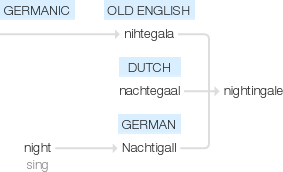Nightingale
Old English nihtegala, of Germanic origin; related to Dutch nachtegaal and German Nachtigall, from the base of night and a base meaning ‘sing’.
wiktionary
From Middle English nyghtyngale, nightingale, niȝtingale, alteration (with intrusive n) of nyghtgale, nightegale, from Old English nihtegala, nihtegale(“nightingale; night-raven”, literally “night-singer”), from Proto-West Germanic *nahtigalā(“nightingale”), equivalent to night + gale. Cognate with Saterland Frisian Noachtegoal(“nightingale”), Dutch nachtegaal(“nightingale”), German Low German Nachtigall(“nightingale”), German Nachtigall(“nightingale”), Danish nattergal(“nightingale”), Swedish näktergal(“nightingale”), Icelandic næturgali(“nightingale”).
Named after Florence Nightingale.
etymonline
nightingale (n.)
"small migratory bird of the Old World, noted for the male's melodious song, heard by night as well as day," Middle English nighte-gale, from Old English næctigalæ, in late Old English nihtegale, a compound formed in Proto-Germanic (compare Dutch nachtegaal, German Nachtigall) from *nakht- "night" (see night) + *galon "to sing," related to Old English giellan "to yell" (from PIE root *ghel- (1) "to call"). With parasitic -n- that began to appear mid-13c. Dutch nightingale "frog" is attested from 1769. In Japanese, "nightingale floor" is said to be the term for boards that creak when you walk on them.
French rossignol (Old French lousseignol) is, with Spanish ruiseñor, Portuguese rouxinol, Italian rosignuolo, from Vulgar Latin *rosciniola, a dissimilation of Latin lusciniola "nightingale," diminutive of luscinia "nightingale," which, according to de Vaan, "might be explained with haplology from *lusci-cania 'singing in the night' or 'blind singer', but this is speculative."
